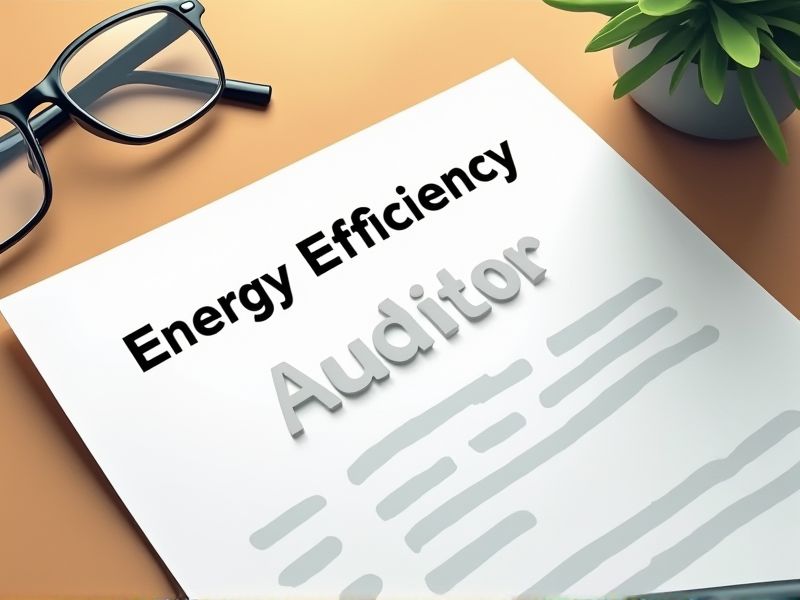
Energy Efficiency Auditors play a critical role in reducing energy consumption and minimizing environmental impact. Certifications ensure they have the necessary expertise in technology, building systems, and energy management practices. They validate an auditor's capability to assess energy usage effectively and recommend practical solutions. Key certifications for Energy Efficiency Auditors include...
Certified Energy Manager (CEM)
Certified Energy Managers (CEMs) provide the expertise needed to identify energy inefficiencies, as their training emphasizes comprehensive knowledge in energy systems and management techniques. Their certification ensures a standardized level of competency, fostering trust among clients and stakeholders in implementing energy-saving measures. With their skill set, CEMs can analyze complex data to tailor strategies that maximally reduce energy consumption, supporting sustainability goals. Their role also includes staying updated on the latest technologies and regulations, which is vital for adapting to evolving energy efficiency standards.
Certified Energy Auditor (CEA)
The demand for Certified Energy Auditors (CEAs) arises because they possess a standardized knowledge of energy management, enabling them to identify and assess energy-saving opportunities effectively. CEAs are essential for implementing energy efficiency audits as they provide credible evaluations, fostering trust among stakeholders and ensuring regulatory compliance. Their expertise in analyzing energy consumption patterns and recommending improvements results in significant cost savings for organizations. CEAs contribute to sustainable practices by helping reduce an entity's carbon footprint through informed energy management strategies.
Certified Measurement and Verification Professional (CMVP)
The CMVP certification ensures that energy efficiency auditors have the necessary skills to accurately measure and verify energy savings from efficiency projects. This reduces the risk of miscalculated energy savings and financial losses for clients. Clients gain increased trust in the auditors' capabilities, driving more projects towards energy efficiency. Ultimately, the accuracy and reliability brought by a CMVP-certified professional create a standardized approach in reporting and improving energy performance.
LEED Accredited Professional (LEED AP)
The presence of a LEED Accredited Professional (LEED AP) significantly enhances an energy efficiency auditor's credibility, as the accreditation signifies expertise in environmentally sustainable building practices. Having a LEED AP ensures a comprehensive understanding of green building standards, which is essential for accurately assessing and improving a structure's energy performance. With knowledge of LEED guidelines, the auditor can identify opportunities for energy conservation that align with recognized sustainability benchmarks. Employing a LEED AP often leads to more insightful recommendations, aiding in the design of energy-efficient solutions that also accommodate potential LEED certification goals.
Certified Building Commissioning Professional (CBCP)
A Certified Building Commissioning Professional (CBCP) ensures that building systems are installed and function according to the owner's requirements and project specifications, directly impacting energy efficiency. CBCPs have specialized knowledge in identifying and rectifying inefficiencies, translating to tangible energy savings in building operations. Their expertise guarantees that energy-efficient technologies are optimized, reducing waste and enhancing overall system performance. Having a CBCP as an Energy Efficiency Auditor provides credibility and assurance that audits will lead to effective energy conservation strategies.
Passive House Consultant (PHC)
A Passive House Consultant (PHC) guides the Energy Efficiency Auditor in accurately assessing and implementing energy-saving measures in buildings. Precise insights from the PHC ensure that the auditor identifies and addresses all inefficiencies in the building's design and systems. By integrating Passive House principles, the auditor can recommend improvements that significantly reduce energy consumption. Collaboration between a PHC and an auditor enhances the overall effectiveness of energy audits, leading to sustainable energy solutions.
BREEAM Accredited Professional
The involvement of a BREEAM Accredited Professional ensures that energy efficiency audits align with internationally recognized sustainability standards. Their expertise supports a comprehensive approach to identifying energy-saving opportunities in buildings. They guide design and decision-making processes, enhancing project outcomes in terms of environmental performance. Compliance with BREEAM principles can also increase the market value of properties, as sustainability becomes a more crucial purchasing criterion.
Energy Manager in Training (EnMT)
Energy Managers in Training (EnMT) enhance the capacity of energy efficiency auditors by providing a structured approach to learning and applying energy management principles. Their training ensures auditors are equipped with the latest methods and technologies, which leads to more accurate assessments and effective recommendations for energy optimization. The presence of an EnMT can bolster the credibility and trustworthiness of energy audits, attracting clients focused on reducing energy costs and environmental impact. The EnMT program also fosters continuous professional development, ensuring auditors remain current in an evolving industry landscape.
Certified Sustainability Practitioner (CSP)
A Certified Sustainability Practitioner (CSP) brings specialized knowledge in sustainable practices, which enhances the effectiveness of energy efficiency auditing by identifying areas for improvement. Possession of a CSP credential denotes a commitment to sustainability, which can increase trust and buy-in from stakeholders looking to meet environmental goals. Energy audits conducted by a CSP are more likely to incorporate innovative approaches to sustainability, potentially reducing energy consumption and operational costs. A CSP's holistic understanding of sustainability ensures that energy efficiency measures are aligned with broader environmental and social responsibilities.
NAHB Certified Green Professional
Becoming an NAHB Certified Green Professional equips energy efficiency auditors with comprehensive knowledge of sustainable building practices, which enhances their capacity to evaluate and recommend energy-saving improvements efficiently. The certification provides an understanding of green technologies and construction techniques, crucial for identifying potential areas of energy loss in buildings. With this credential, auditors gain credibility and trust from clients, as the certification signifies adherence to recognized industry standards. As energy regulations and consumer demand for environmentally friendly solutions increase, the certification ensures that auditors remain competitive and relevant in the field.
Summary
When you obtain certifications as an Energy Efficiency Auditor, your credibility significantly increases. This enhanced trust can lead to more clients seeking your expertise in optimizing energy use. Organizations often see a reduction in energy costs due to your certified recommendations. Certified auditors contribute to a broader impact by promoting sustainable practices and compliance with energy regulations.
